Unit 4 Why don't you talk to your parents?Section A 1a-2d 知识点串讲 课件(共有PPT12张)
文档属性
| 名称 | Unit 4 Why don't you talk to your parents?Section A 1a-2d 知识点串讲 课件(共有PPT12张) | 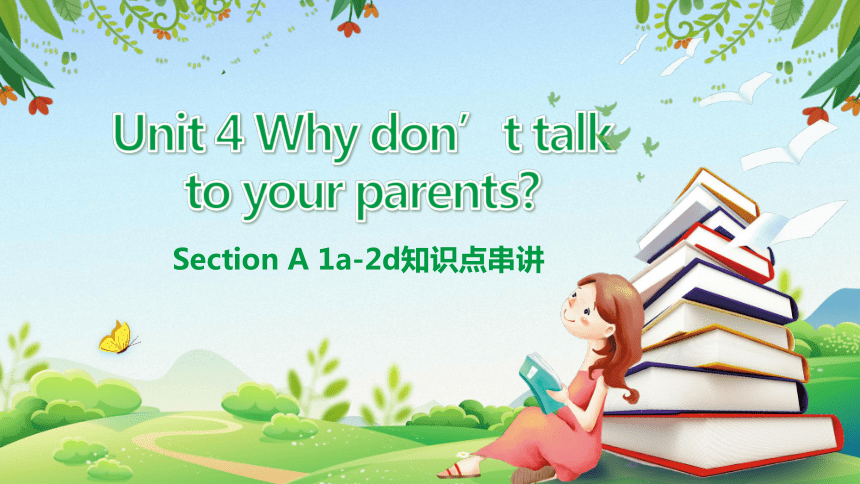 | |
| 格式 | pptx | ||
| 文件大小 | 3.9MB | ||
| 资源类型 | 教案 | ||
| 版本资源 | 人教新目标(Go for it)版 | ||
| 科目 | 英语 | ||
| 更新时间 | 2022-03-17 11:13:09 | ||
图片预览

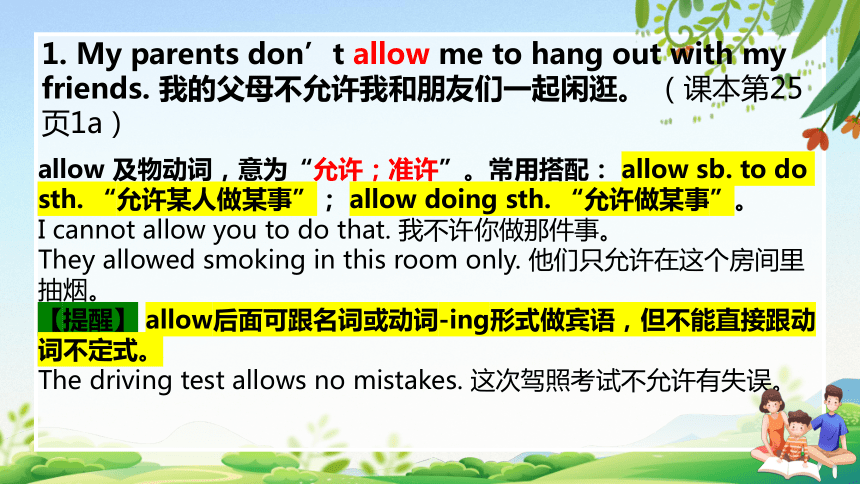
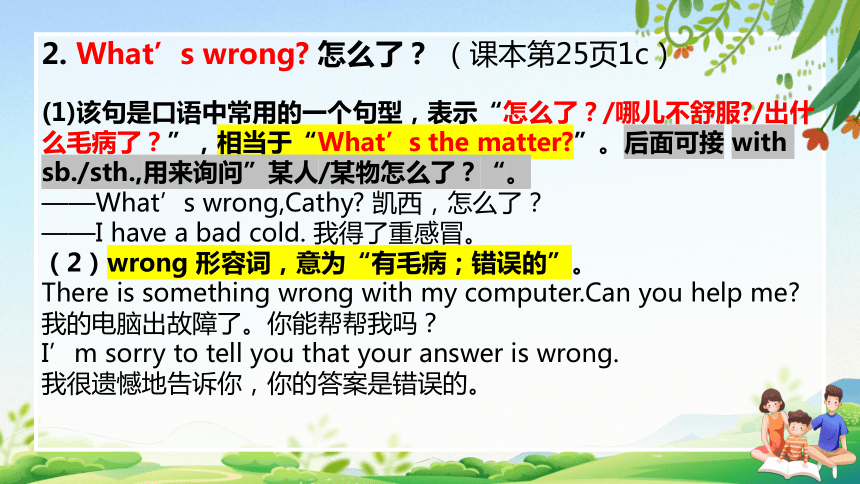
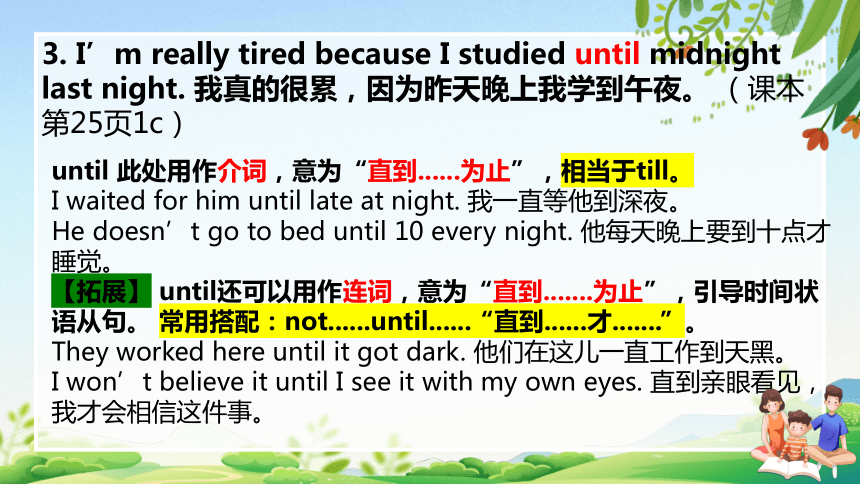

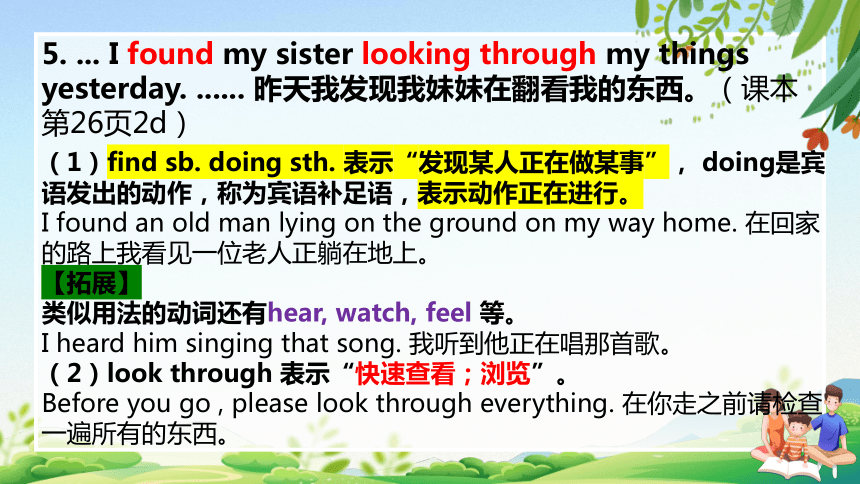
文档简介
(共12张PPT)
Unit 4 Why don’t talk to your parents
Section A 1a-2d知识点串讲
1. My parents don’t allow me to hang out with my friends. 我的父母不允许我和朋友们一起闲逛。 (课本第25页1a)
allow 及物动词,意为“允许;准许”。常用搭配: allow sb. to do sth. “允许某人做某事”; allow doing sth. “允许做某事”。
I cannot allow you to do that. 我不许你做那件事。
They allowed smoking in this room only. 他们只允许在这个房间里抽烟。
【提醒】 allow后面可跟名词或动词-ing形式做宾语,但不能直接跟动词不定式。
The driving test allows no mistakes. 这次驾照考试不允许有失误。
2. What’s wrong 怎么了? (课本第25页1c)
(1)该句是口语中常用的一个句型,表示“怎么了?/哪儿不舒服 /出什么毛病了?”,相当于“What’s the matter ”。后面可接 with sb./sth.,用来询问”某人/某物怎么了?“。
——What’s wrong,Cathy 凯西,怎么了?
——I have a bad cold. 我得了重感冒。
(2)wrong 形容词,意为“有毛病;错误的”。
There is something wrong with my computer.Can you help me 我的电脑出故障了。你能帮帮我吗?
I’m sorry to tell you that your answer is wrong.
我很遗憾地告诉你,你的答案是错误的。
3. I’m really tired because I studied until midnight last night. 我真的很累,因为昨天晚上我学到午夜。 (课本第25页1c)
until 此处用作介词,意为“直到......为止”,相当于till。
I waited for him until late at night. 我一直等他到深夜。
He doesn’t go to bed until 10 every night. 他每天晚上要到十点才睡觉。
【拓展】 until还可以用作连词,意为“直到.......为止”,引导时间状语从句。 常用搭配:not......until......“直到......才.......”。
They worked here until it got dark. 他们在这儿一直工作到天黑。
I won’t believe it until I see it with my own eyes. 直到亲眼看见,我才会相信这件事。
4. Why don’t you go to sleep earlier this evening 今天晚上你为什么不早点睡呢? (课本第25页1c)
Why don’t you... 表示“为何不......呢?”,常用来提出建议或征求对方的意见,相当于“Why not do... ”.
Why don’t you have a cup of tea 为何不来一杯奶茶呢?
Why don’t you go with me = Why not go with me 为什么不和我一起去呢?
【拓展】
Why not 是英语口语中常用的一个句型,用于表达赞同、惊喜或不高兴的反问语气。
——Can you come to my birthday party 你能来参加我的生日聚会吗?
——Oh, why not 噢,为什么不呢?
5. ... I found my sister looking through my things yesterday. ...... 昨天我发现我妹妹在翻看我的东西。(课本第26页2d)
(1)find sb. doing sth. 表示“发现某人正在做某事”, doing是宾语发出的动作,称为宾语补足语,表示动作正在进行。
I found an old man lying on the ground on my way home. 在回家的路上我看见一位老人正躺在地上。
【拓展】
类似用法的动词还有hear, watch, feel 等。
I heard him singing that song. 我听到他正在唱那首歌。
(2)look through 表示“快速查看;浏览”。
Before you go , please look through everything. 在你走之前请检查一遍所有的东西。
6. Although she’s wrong,it’s not a big deal. 尽管她做得不对,但也没什么了不起的。(课本第26页2d)
(1)although 连词,意为“虽然;尽管”,引导让步状语从句,相当于though。
Although/ Though he is very old, he is still quite strong. 他虽然很老了,但仍然很强壮。
【拓展】
在同一个句子中,although/though 不能与but同时出现,但可以与yet/still 同时出现。
(2)deal 此处用作名词,意为“协议;交易”。常用短语: big deal 重要的事。
We lost on that deal. 那笔生意我们受到了损失。
7. Hope things work out. 希望事情会好起来。(课本第26页2d)
(1)该句为表达祝愿的省略句,完整的表达为“ I hope that things will work out” 。
Hope things go all right with you. 祝你万事如意。
(2)work out 此处表示“成功地发展,主语通常是事物; 其主语是人时,则表示”解决;算出来“。
work out 为”动词+副词“结构的短语, 代词做宾语时须放在短语中间。
Everything is working out well. 事事都很如意。
Don’t give up hope. You can work it out. 别放弃希望。 你会解决它的。
Exercise
单项选择。
1.My parents didn’t allow me ______to the party.
A. go B. to go C. goes D. went
2.—You look unhappy,John. ___________
—Well, I found my mother looking through my mobile phone yesterday.
A. You want to rest
B. What’s wrong
C. How do you do
3.The group had to wait ______ after 12 to check in at the hotel.
A. from B. until C. from D. at
4.—I feel upset because I am too heavy.
—________ do more exercise to lose some weight
A. Why don’t B. Why not C. Why not to
5. Almost every university now has a website which allows us to _____ the information about it.
A. look at B. look after
C. look around D. look through
6.Life is a journey with trouble,but with care and wisdom you can _____ any problem you face.
A. work out B. hand out C. find out D. put out
7.Don’t worry! I’m sure you’ll _____ your classmates if you are kind and friendly to them.
A. catch up with B. be pleased with
C. get on well with D. agree with
8.Li Lei didn’t play computer games last weekend. _____, he worked s a volunteer in an old people’s home.
A. Instead B.Certainly C.Though D.Gradually
Thanks for watching!
Unit 4 Why don’t talk to your parents
Section A 1a-2d知识点串讲
1. My parents don’t allow me to hang out with my friends. 我的父母不允许我和朋友们一起闲逛。 (课本第25页1a)
allow 及物动词,意为“允许;准许”。常用搭配: allow sb. to do sth. “允许某人做某事”; allow doing sth. “允许做某事”。
I cannot allow you to do that. 我不许你做那件事。
They allowed smoking in this room only. 他们只允许在这个房间里抽烟。
【提醒】 allow后面可跟名词或动词-ing形式做宾语,但不能直接跟动词不定式。
The driving test allows no mistakes. 这次驾照考试不允许有失误。
2. What’s wrong 怎么了? (课本第25页1c)
(1)该句是口语中常用的一个句型,表示“怎么了?/哪儿不舒服 /出什么毛病了?”,相当于“What’s the matter ”。后面可接 with sb./sth.,用来询问”某人/某物怎么了?“。
——What’s wrong,Cathy 凯西,怎么了?
——I have a bad cold. 我得了重感冒。
(2)wrong 形容词,意为“有毛病;错误的”。
There is something wrong with my computer.Can you help me 我的电脑出故障了。你能帮帮我吗?
I’m sorry to tell you that your answer is wrong.
我很遗憾地告诉你,你的答案是错误的。
3. I’m really tired because I studied until midnight last night. 我真的很累,因为昨天晚上我学到午夜。 (课本第25页1c)
until 此处用作介词,意为“直到......为止”,相当于till。
I waited for him until late at night. 我一直等他到深夜。
He doesn’t go to bed until 10 every night. 他每天晚上要到十点才睡觉。
【拓展】 until还可以用作连词,意为“直到.......为止”,引导时间状语从句。 常用搭配:not......until......“直到......才.......”。
They worked here until it got dark. 他们在这儿一直工作到天黑。
I won’t believe it until I see it with my own eyes. 直到亲眼看见,我才会相信这件事。
4. Why don’t you go to sleep earlier this evening 今天晚上你为什么不早点睡呢? (课本第25页1c)
Why don’t you... 表示“为何不......呢?”,常用来提出建议或征求对方的意见,相当于“Why not do... ”.
Why don’t you have a cup of tea 为何不来一杯奶茶呢?
Why don’t you go with me = Why not go with me 为什么不和我一起去呢?
【拓展】
Why not 是英语口语中常用的一个句型,用于表达赞同、惊喜或不高兴的反问语气。
——Can you come to my birthday party 你能来参加我的生日聚会吗?
——Oh, why not 噢,为什么不呢?
5. ... I found my sister looking through my things yesterday. ...... 昨天我发现我妹妹在翻看我的东西。(课本第26页2d)
(1)find sb. doing sth. 表示“发现某人正在做某事”, doing是宾语发出的动作,称为宾语补足语,表示动作正在进行。
I found an old man lying on the ground on my way home. 在回家的路上我看见一位老人正躺在地上。
【拓展】
类似用法的动词还有hear, watch, feel 等。
I heard him singing that song. 我听到他正在唱那首歌。
(2)look through 表示“快速查看;浏览”。
Before you go , please look through everything. 在你走之前请检查一遍所有的东西。
6. Although she’s wrong,it’s not a big deal. 尽管她做得不对,但也没什么了不起的。(课本第26页2d)
(1)although 连词,意为“虽然;尽管”,引导让步状语从句,相当于though。
Although/ Though he is very old, he is still quite strong. 他虽然很老了,但仍然很强壮。
【拓展】
在同一个句子中,although/though 不能与but同时出现,但可以与yet/still 同时出现。
(2)deal 此处用作名词,意为“协议;交易”。常用短语: big deal 重要的事。
We lost on that deal. 那笔生意我们受到了损失。
7. Hope things work out. 希望事情会好起来。(课本第26页2d)
(1)该句为表达祝愿的省略句,完整的表达为“ I hope that things will work out” 。
Hope things go all right with you. 祝你万事如意。
(2)work out 此处表示“成功地发展,主语通常是事物; 其主语是人时,则表示”解决;算出来“。
work out 为”动词+副词“结构的短语, 代词做宾语时须放在短语中间。
Everything is working out well. 事事都很如意。
Don’t give up hope. You can work it out. 别放弃希望。 你会解决它的。
Exercise
单项选择。
1.My parents didn’t allow me ______to the party.
A. go B. to go C. goes D. went
2.—You look unhappy,John. ___________
—Well, I found my mother looking through my mobile phone yesterday.
A. You want to rest
B. What’s wrong
C. How do you do
3.The group had to wait ______ after 12 to check in at the hotel.
A. from B. until C. from D. at
4.—I feel upset because I am too heavy.
—________ do more exercise to lose some weight
A. Why don’t B. Why not C. Why not to
5. Almost every university now has a website which allows us to _____ the information about it.
A. look at B. look after
C. look around D. look through
6.Life is a journey with trouble,but with care and wisdom you can _____ any problem you face.
A. work out B. hand out C. find out D. put out
7.Don’t worry! I’m sure you’ll _____ your classmates if you are kind and friendly to them.
A. catch up with B. be pleased with
C. get on well with D. agree with
8.Li Lei didn’t play computer games last weekend. _____, he worked s a volunteer in an old people’s home.
A. Instead B.Certainly C.Though D.Gradually
Thanks for watching!
同课章节目录
- Unit 1 What's the matter?
- Section A
- Section B
- Unit 2 I'll help to clean up the city parks.
- Section A
- Section B
- Unit 3 Could you please clean your room?
- Section A
- Section B
- Unit 4 Why don't you talk to your parents?
- Section A
- Section B
- Unit 5 What were you doing when the rainstorm came
- Section A
- Section B
- Review of Units 1-5
- Unit 6 An old man tried to move the mountains.
- Section A
- Section B
- Unit 7 What's the highest mountain in the world?
- Section A
- Section B
- Unit 8 Have you read Treasure Island yet?
- Section A
- Section B
- Unit 9 Have you ever been to a museum?
- Section A
- Section B
- Unit 10 I've had this bike for three years.
- Section A
- Section B
